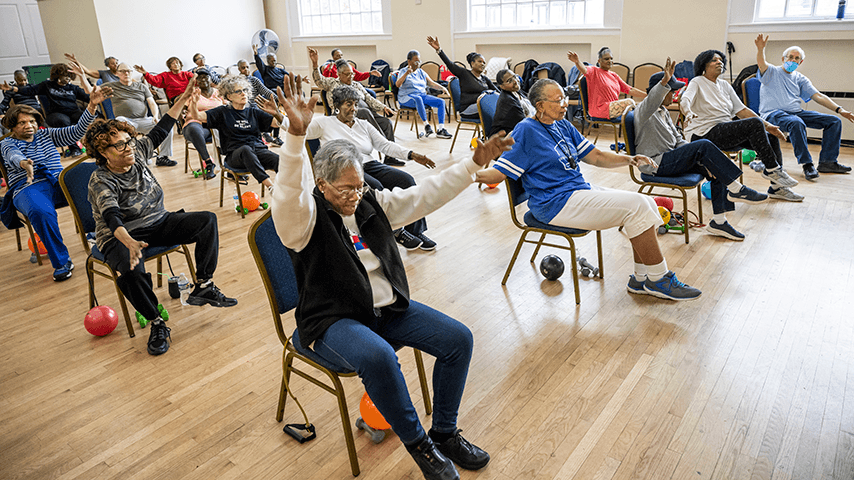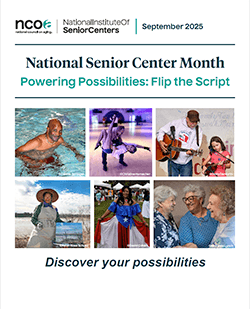National Senior Center Month Program Guide
8 min read

Welcome to National Senior Center Month
Powering Possibilities: Flip the Script
September 2025
September is National Senior Center Month, a time to recognize the vital role senior centers play in enhancing the lives of older adults and strengthening communities. This year’s theme—"Powering Possibilities: Flip the Script"—encourages us to challenge outdated stereotypes about aging and elevate the positive contributions of older adults and the centers that serve them.
More than 10,000 senior centers across the United States connect older adults to wellness, creativity, purpose, and essential services. From their grassroots beginnings to their recognition in the Older Americans Act, senior centers have evolved into dynamic community hubs that reflect the diversity and resilience of today’s older population.
Why celebrate National Senior Center Month?
National Senior Center Month is more than a celebration—it’s a strategic opportunity. It’s a chance for senior centers to shine a spotlight on the critical role they play in their communities. This month offers an ideal platform to engage new participants, deepen relationships with stakeholders, and elevate your center’s profile.
It’s also a time to challenge misperceptions.
Many people still hold outdated ideas about what senior centers are and who they serve. September is your moment to flip the script.
Show the community that your center is a dynamic, welcoming place that powers possibilities for aging through connection, innovation, and impact. Whether it’s health and wellness programs, economic support, creative expression, or digital inclusion, your work makes a meaningful difference every day.
National Senior Center Month Checklist
Use this checklist to plan, promote, and engage:
- Strategize: Plan how to elevate your center’s visibility.
- Customize Materials: Personalize the 2025 Senior Center Month poster.
- Engage Elected Officials: Invite leaders to speak, visit or participate in programs.
- Diversify Events: Try themed weeks or introduce new activities.
- Include Participants: Invite participants to help plan or lead programs.
- Use the Publicity Guide: Leverage tips and timelines for local media outreach.
- Show NCOA’s Videos: Promote your center with national campaign videos.
Customize the 2025 poster
Tailor the National Senior Center Month poster to your center! Add your own photos and contact information. Here’s how:

- Download and save the poster to your computer.
- Open the poster.
- Select the bottom right box and upload your logo.
- Select the box on the bottom left and fill in: a) Senior Center name b) Contact information c) Website
If you customize your poster, please save it as a PDF and share it with us at membership@ncoa.org.
Flip the Script on Aging
In alignment with the Administration for Community Living (ACL) and the National Center to Reframe Aging, this year’s theme promotes a shift in how we talk about aging.
Instead of focusing on limitations, highlight:
- The value and contributions of older adults
- The importance of social connection and lifelong learning
- The role of senior centers in promoting health, economic security, and social engagement
Use the Older Americans Month 2025 “Flip the Script” Toolkit to craft positive and empowering messaging. These tools can help replace ageist language with narratives that reflect aging as a natural, dynamic life stage.
Reframing Aging principles to keep in mind:
- Aging is a normal part of life—not a problem to be solved.
- Older adults contribute in diverse and meaningful ways—as caregivers, workers, volunteers, and community leaders.
- Communities thrive when everyone is supported across their lifespan.
Learn more at: www.reframingaging.org
Flip the Script on senior centers
This September, show how your center:
- Builds community and connection
- Challenges ageist assumptions
- Sparks possibilities for all generations
Together, we can rewrite the narrative around aging—demonstrating that senior centers are essential, innovative, and relevant to today’s older adults.
How senior centers power possibilities
Senior centers are not just places to gather—they are engines of innovation and engagement. They meet older adults where they are and help them thrive through:
- Social connection that combats loneliness and isolation
- Health and wellness programs that promote vitality
- Economic security resources that offer stability
- Creative and cultural engagement that brings joy and purpose
- Access to services that support independence and well-being
- Intergenerational activities and caregiving support
- Technology access and training to promote digital inclusion
Ideas to celebrate and connect
Design events and programming that reflect your community’s needs and brings this year’s theme to life.
Healthy Aging: Host classes on physical activity, chronic disease management, falls prevention, brain health, or healthy cooking.
Explore: Health and Human Services, NCOA Center for Healthy Aging
Economic Security: Offer support with benefits screenings, tax preparation, or financial education.
Use: BenefitsCheckUp® , NCOA Center for Economic Well-Being
Intergenerational Connections: Celebrate Grandparents Day (Sept. 8), host storytelling events, or partner with local schools, colleges, or youth groups.
Resources: Grand Connections series, Generations United
Digital Connections: Provide one-on-one tech assistance, introduce hybrid programming, or offer basic internet skills workshops or demonstrations of AI.
Resource: OATS
Community Engagement: Host open houses to showcase the center, its programs, and opportunities for social engagement. Offer free demonstration classes to introduce new activities. Throw themed parties or special events to bring people together. Invite community leaders and elected officials to visit and experience the impact of your center firsthand.
Resource: EngAGED Resource Center Innovations Hub
Support Mental Health and Well-Being : Senior centers can play a major role in supporting emotional wellness. Consider:
- Social connection programs (check-in calls, support groups)
- Classes on mindfulness and stress reduction
- Partnerships with behavioral health providers
Resource: Behavioral Health and Aging Certificate, offered in partnership with Boston University CADER, with discounts for NISC members.
Share Your Stories: Show the Impact
This month is an opportunity to educate your community, engage new partners, and amplify your impact.
Use NCOA’s Senior Center Fact Sheet and the National Center to Reframing Aging Older Americans Month Toolkit to guide your outreach through newsletters, social media, and community events.
Messaging tips:
Avoid terms like “still active,” “declining,” or “elderly.” Instead, highlight empowerment, resilience, and engagement.
Let Us Share Your Story
Want to be featured nationally? A different senior center is featured each month on our Senior Center Spotlight. Each month, NCOA spotlights a senior center on ncoa.org.
Email membership@ncoa.org to be considered for a future Senior Center Spotlight.
Share Participant Stories
Senior centers change lives through connection, support, and opportunity. Whether someone:
- Found renewed purpose
- Reconnected socially
- Improved their health
- Gained financial stability
- Benefited from a specific program
Their stories matter.
Encourage participants to share how your center has made a difference. These testimonials can inform policy, advocate for funding, and inspire others.
Submit stories online or email us at membership@ncoa.org.
Educate Elected Officials: Flip the Script on Public Policy
Behind every program is a policy decision. Make National Senior Center Month a time to raise awareness and influence public investment. Our Advocacy Basics resource page brings together information on many topics such as best practices for getting an elected official to your events and attending town halls.
As you might know, Congress is currently addressing the reauthorization of the Older Americans Act. This gives us an opportunity to ensure that older adults in the community are supported through programs and services including support for senior centers. You can learn more about plans from Congress and the White House and NCOA priorities about the Older Americans Act on our website.
You can find more information about policy issues that impact older adults on our Public Policy page. The NCOA Action Center is a great way to lend your voice to proposed federal legislation.
Tell Your Stories
Organize older adults to write stories about what federal decisions could mean to them and deliver the stories to an elected official, staffer, or candidate for public office. This can help you enlist elected officials for support and arm them with real stories for national budget debates. Use our 10 Tips to Harness the Power of Stories for ways to craft message and work with NCOA to get them delivered.
Champion a National Senior Center Month Proclamation
Ask your mayor or other official to issue a proclamation in honor of National Senior Center Month and build an event around it. A sample proclamation is in the Publicity Guide.
Broadcast Your Message
Invite a local TV or radio station to hold a remote broadcast to highlight your center’s work. Enlist participants, community partners, and other key people for interviews about your center’s resources and aging issues. Get your stories told in local newspapers. Engage in social media. Share our videos. Or create your own video to share on social media. See the Publicity Guide for more ideas and a sample media plan.
Showcase Best Practices
National Senior Center Month is the perfect time to highlight your center's innovative and impactful programs. Share your successes with your community by hosting showcase events, inviting local leaders and funders, and encouraging other centers to learn from your example.
Visit the NCOA Programs of Excellence Clearinghouse to explore recognized programs from across the country and get inspired. If your center is doing exceptional work, consider submitting your program for national recognition during the upcoming Programs of Excellence call for submissions, opening in January 2026.
Align Your Events with September Awareness Campaigns
Falls Prevention Awareness Week
Sept. 22-26, 2025
Offer evidence-based programs, balance screenings, and safety checks.
NCOA’s Falls Prevention Awareness Week Toolkit
Health & Wellness
National Food Safety Month
Hunger Action Month
National Women’s Health & Fitness Day (Sept. 25)
Civic & Social Engagement
International Literacy Day (Sept. 8)
National Voter Registration Day (Sept. 24)
National Employ Older Workers Week (Sept. 22–28)&
Fun & Enrichment
International Women’s Friendship Month
Grandparents Day (Sept. 8)
Sound the Alarm Fire Safety Campaign
Let’s make National Senior Center Month 2025 a powerful demonstration of what senior centers truly are—vibrant, essential hubs that flip the script on aging and power possibilities for older adults every day. Use this opportunity to showcase your impact, amplify your message, and lead the movement toward a more realistic and empowered vision of aging.
